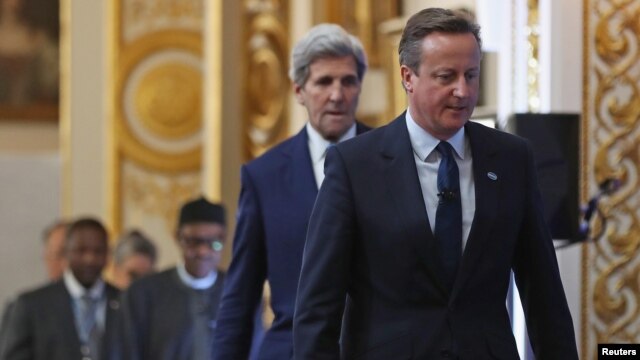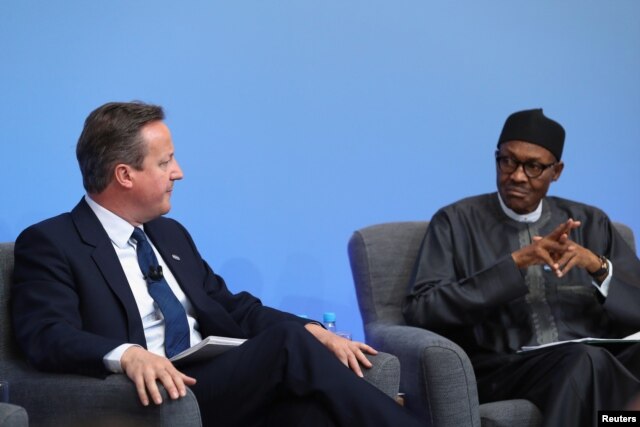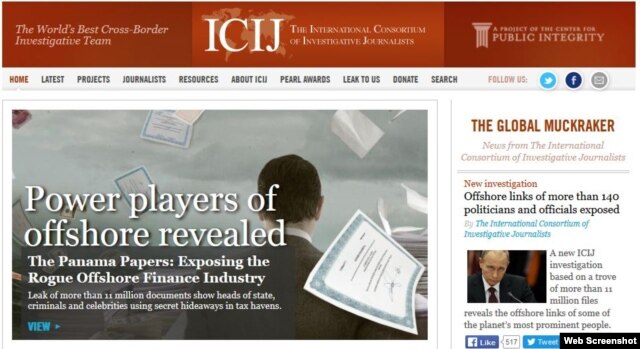News / USA
US, Britain Share Blame for 'Pandemic' Corruption at London Summit
British Prime Minister Cameron, followed by U.S. Secretary of State John Kerry, arrives to open the international anti-corruption summit on May 12, 2016 in London, England.
Last updated on: May 12, 2016 10:57 AM
LONDON—
Thursday’s world summit on fighting corruption was a time for Britain and the United States to look at their own policies and their role as shelters for billions of dollars stolen by corrupt politicians in developing countries.
The London summit shifted the focus on global corruption, turning the spotlight of blame away from African generals, oligarchs and corrupt dictators and toward the rich countries, whose banks and real estate brokers have been the benefactors of the stolen wealth of nations.
U.S. Secretary of State John Kerry said tens of billions of dollars in stolen money - funds that that could be used for education or building bridges in underdeveloped lands - instead are hidden in banks “in countries including ours.”
“We are fighting a battle - all of us - for our states, for our countries, for our nation state. Corruption is as much of an enemy because it destroys nation states as some of the extremists we are fighting,” Kerry told delegates at the summit.
"The extremism we see in the world today comes in no small degree from the utter exasperation that people have with the sense that the system is rigged," the top American diplomat said. "And we see this anger manifesting itself in different forms in different elections around the world - including ours."
Nigerian President Muhammadu Buhari listens as British Prime Minister Cameron opens the international anti-corruption summit on May 12, 2016 in London, England.
'The world has changed'
The one-day meeting drew leaders from Afghanistan, Colombia, Nigeria and other countries. British officials said the aim was to step up global action to expose, punish and drive out corruption at all levels of society.
“If we were having this anti-corruption summit 10 years ago, we would have been talking about African kleptocrats, the theft of state assets from the people,” said Alex Cobham of the Tax Justice Network, a British advocacy group. Now, he said, the world has changed.
The one-day meeting drew leaders from Afghanistan, Colombia, Nigeria and other countries. British officials said the aim was to step up global action to expose, punish and drive out corruption at all levels of society.
“If we were having this anti-corruption summit 10 years ago, we would have been talking about African kleptocrats, the theft of state assets from the people,” said Alex Cobham of the Tax Justice Network, a British advocacy group. Now, he said, the world has changed.
“We’re really thinking about the providers of the financial secrecy that don’t just facilitate but actively drive corruption of different sorts all around the world,” he told VOA.
In the background of the summit are the Panama Papers revelations about how and where the world’s powerful hide their money.
For Cameron, the revelations hit home, showing how his late father ran an offshore fund to avoid paying British taxes. The prime minister eventually said that he, too, had a stake in the dealings.
Screen grab of website for the International Consortium of Investigative Journalists, which reported on the Panama Papers, likely the biggest leak of inside information in history.
Pressure for reforms
The Panama Papers disclosures fueled calls for reforms in Britain’s offshore possessions, after it was learned that more than half of the 210,000 companies exposed were registered in the British Virgin Islands.
The prime minister announced measures including a public register intended to force companies to name their real owners are - a measure that British government officials claim will be the first of its kind.
“Why I think this matters so much is that I believe that corruption is the cancer at the heart of so many problems we need to tackle in our world. If we want to see countries escape poverty and become wealthy, we need to tackle corruption,” the British leader said Thursday.
The Panama Papers named relatively few Americans and no high-ranking public officials. But anti-corruption advocates see the United States as a major area of concern about tax evasion and money laundering, in states such as Delaware, Nevada and Wyoming, which have been criticized for allowing corporations to be formed inexpensively and secretively.
Kerry said a proposed law will force companies formed in the U.S. to report complete information about their owners, and a rule will require banks to keep records on the true owners of their corporate customers.
(L-R) Sarah Chayes from the Carnegie Endownment for International Peace,British Prime Minister Cameron, Afghan President Ghani and French magistrate Eva Jolly share a platform at the international anti-corruption summit, London, Britain, May 12, 2016.
Rich nations try to rebuild trust
Washington and London see combating corruption as a matter of legitimacy and security, analysts say, especially in the wake a decade of financial crises that have reduced millions of people to poverty, unemployment and frustration.
Tim Evans, a professor of political economy at London’s Middlesex University, sees the summit - and, more broadly, the drive to combat corruption - as a sign of concern among the elite nations.
“They’re worried at the loss of legitimacy that will come from rich and powerful people being able to evade taxes and get away with it. So, I think there’s huge pressure on elites to be seen to be engaging the subject and to be doing something about it.”
“Given some of the things, some of the riots and problems we’ve seen in Europe and in the United States in recent years, the politicians are fearful, and they’re becoming focused on trying to rebuild trust and transparency,” he told VOA.
The summit got off to a somewhat awkward start after cameras overheard the British prime minister describing Afghanistan and Nigeria as “fantastically corrupt.”
“They’re worried at the loss of legitimacy that will come from rich and powerful people being able to evade taxes and get away with it. So, I think there’s huge pressure on elites to be seen to be engaging the subject and to be doing something about it.”
“Given some of the things, some of the riots and problems we’ve seen in Europe and in the United States in recent years, the politicians are fearful, and they’re becoming focused on trying to rebuild trust and transparency,” he told VOA.
The summit got off to a somewhat awkward start after cameras overheard the British prime minister describing Afghanistan and Nigeria as “fantastically corrupt.”
Nigerian President Muhammadu Buhari, who has led an aggressive anti-corruption campaign in his country, praised Cameron’s decision to hold the summit. Members of the Nigerian delegation did not discuss the prime minister's comments.
During the summit, Buhari said to Cameron: “I thank you very much for your courage for taking the opportunity to mobilize us and take this very, very topical and serious subject. Corruption is one of the greatest enemies of our time."





No comments:
Post a Comment